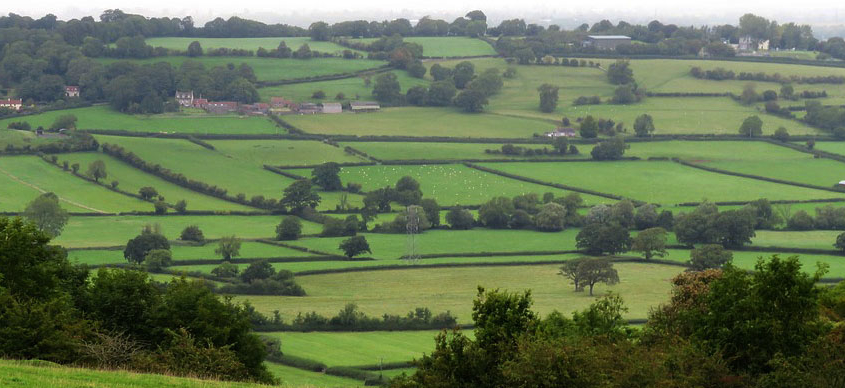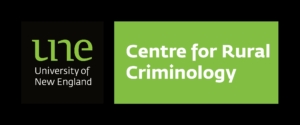Roundtable alert! The Impact of Natural Resources & Energy Development on Rural Crime
The International Society for the Study of Rural Crime – @RuCrimSociety – invites you to this virtual roundtable! The focus will be on “The Impact of Natural Resources & Energy Development on Rural Crime”.
The roundtable is free to attend.
Register via EventBrite:
Check the time and date for the event in your locaton here: https://www.timeanddate.com/worldclock/converter.html?iso=20211103T213000&p1=210&p2=tz_gmt
Interested in joining the ISSRC? Visit https://issrc.net/join-now/
Download the flier
About this event
The extraction of natural resources and the development of large-scale energy projects has had destructive environmental and social impacts on some rural communities throughout the globe.
This roundtable brings together four leading experts who have researched the impacts of population increases and industrial development on rural communities, including the relationships between these booms and social impacts including antisocial behavior and crime.
The four panelists discuss the outcomes of their current research and the potential for the future as we enter the early stages of an energy crisis.
They respond to two key questions:
- What are the impacts of natural resource and energy development on rural crime?
- What can be done about this issue?
Ample opportunity will be provided for attendees to engage with the panel.
Featuring
Moderator – Dr Matt Thomas
Professor, California State University, Chico
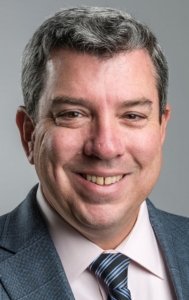 Dr Thomas received a BA from St. Joseph’s University, and an MA and PhD from the University of Maryland, College Park. He teaches political science, criminal justice, and public administration in the department’s undergraduate and graduate programs. He is the coordinator of the MA in Political Science program, and is the internship coordinator for the MPA program. His research focuses on both urban politics, including work on New Orleans (Reforming New Orleans: The Contentious Politics of Change in the Big Easy with Peter Burns, Cornell Press), and on criminal justice topics, including work on police strength, concealed weapons on campus, and the impacts of AB 109 and Prop 47 on California’s criminal justice realignment agenda. Matt received the university’s Outstanding Service Award in 2016-17.
Dr Thomas received a BA from St. Joseph’s University, and an MA and PhD from the University of Maryland, College Park. He teaches political science, criminal justice, and public administration in the department’s undergraduate and graduate programs. He is the coordinator of the MA in Political Science program, and is the internship coordinator for the MPA program. His research focuses on both urban politics, including work on New Orleans (Reforming New Orleans: The Contentious Politics of Change in the Big Easy with Peter Burns, Cornell Press), and on criminal justice topics, including work on police strength, concealed weapons on campus, and the impacts of AB 109 and Prop 47 on California’s criminal justice realignment agenda. Matt received the university’s Outstanding Service Award in 2016-17.
Panelist – Dr Jeffrey B. Jacquet
Associate Professor, Ohio State University (Ohio, United States)
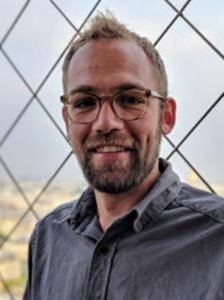 Dr Jacquet is an Associate Professor of Rural Sociology in the School of Environment and Natural Resources at The Ohio State University in Columbus, Ohio, USA. One of the first to study the community-level implications of hydraulic fracturing, Dr Jacquet has gone on to examine the social ramifications of a range of renewable- and non-renewable-energy systems at institutions including the University of Wyoming, Cornell University, and South Dakota State University. At Ohio State, Jacquet leads students through coursework, research, and mentorship to examine the areas of energy, environment, and rural societies. He is the lead editor of a new collected volume titled Energy Impacts: A Multidisciplinary Exploration of North American Energy Development published in 2021 by the University Press of Colorado.
Dr Jacquet is an Associate Professor of Rural Sociology in the School of Environment and Natural Resources at The Ohio State University in Columbus, Ohio, USA. One of the first to study the community-level implications of hydraulic fracturing, Dr Jacquet has gone on to examine the social ramifications of a range of renewable- and non-renewable-energy systems at institutions including the University of Wyoming, Cornell University, and South Dakota State University. At Ohio State, Jacquet leads students through coursework, research, and mentorship to examine the areas of energy, environment, and rural societies. He is the lead editor of a new collected volume titled Energy Impacts: A Multidisciplinary Exploration of North American Energy Development published in 2021 by the University Press of Colorado.
Panelist – Dr Christopher O’Connor
Associate Professor, University of Ontario Institute of Technology (Ontario, Canada)
 Dr O’Connor is an Associate Professor of Criminology at Ontario Tech University. He received his PhD in Sociology from the University of Calgary where he studied school-to-work transitions and perceptions of crime in the energy boomtown of Fort McMurray, Alberta. His research examines energy resource boomtowns, people’s use and perceptions of emerging technology, policing, and young people’s participation in crime, perceptions of the environment, and school-to-work transitions. Dr O’Connor has recently completed a SSHRC Insight Development Grant examining the risks and opportunities of hydraulic fracturing and related renewable and non-renewable energy technologies. He is currently co-director on a SSHRC-funded Partnership Development grant examining facial recognition use by the police which involves working with a range of multi-disciplinary stakeholders to examine the viability of the technology for police use.
Dr O’Connor is an Associate Professor of Criminology at Ontario Tech University. He received his PhD in Sociology from the University of Calgary where he studied school-to-work transitions and perceptions of crime in the energy boomtown of Fort McMurray, Alberta. His research examines energy resource boomtowns, people’s use and perceptions of emerging technology, policing, and young people’s participation in crime, perceptions of the environment, and school-to-work transitions. Dr O’Connor has recently completed a SSHRC Insight Development Grant examining the risks and opportunities of hydraulic fracturing and related renewable and non-renewable energy technologies. He is currently co-director on a SSHRC-funded Partnership Development grant examining facial recognition use by the police which involves working with a range of multi-disciplinary stakeholders to examine the viability of the technology for police use.
Panelist – Professor Thomasine Heitkamp
Emeritus Faculty and LCSW, University of North Dakota (North Dakota, USA)
 Professor Heitkamp served as a faculty member at the University of North Dakota for 39 years, achieving the highest rank of Chester Fritz Distinguished Professor. She is currently an Emeritus faculty and a Licensed Clinical Social Worker in North Dakota. She also serves as a Behavioral Health Research Specialists for the University of North Dakota – Office of Research and Economic Development. Professor Heitkamp served as Co-PI for a National Institute of Justice-funded three-year study to examine the impact of oil development on inter-personal violence in the Bakken Oil fields of North Dakota and Montana. She has served as the PI on several large grant-funded projects including her service as PI and Co-Director of the Mountain Plains Mental Health Technology Transfer Center and Addiction Technology Transfer Center (ATTC). She has published in a host of peer-reviewed journals with a focus on workforce development serving tribal and rural communities.
Professor Heitkamp served as a faculty member at the University of North Dakota for 39 years, achieving the highest rank of Chester Fritz Distinguished Professor. She is currently an Emeritus faculty and a Licensed Clinical Social Worker in North Dakota. She also serves as a Behavioral Health Research Specialists for the University of North Dakota – Office of Research and Economic Development. Professor Heitkamp served as Co-PI for a National Institute of Justice-funded three-year study to examine the impact of oil development on inter-personal violence in the Bakken Oil fields of North Dakota and Montana. She has served as the PI on several large grant-funded projects including her service as PI and Co-Director of the Mountain Plains Mental Health Technology Transfer Center and Addiction Technology Transfer Center (ATTC). She has published in a host of peer-reviewed journals with a focus on workforce development serving tribal and rural communities.
Panelist – Dr Rick Ruddell
Professor, University of Regina (Saskatchewan , Canada)
 Dr Ruddell serves as the Law Foundation of Saskatchewan Chair in Police Research at the University of Regina, Canada. Prior to this appointment he served as Director of Operational Research with the Correctional Service of Canada, and held faculty positions at Eastern Kentucky University and the California State University, Chico. Prior to his academic career, he served with the Saskatchewan Ministry of Corrections, Public Safety and Policing as a supervisor and manager. Dr Ruddell’s research has focused upon policing, criminal justice policy, and juvenile justice, and he has published over 150 articles and technical reports. He has written extensively about the impact of natural resource booms on rural communities and published Oil, Gas, and Crime: The Dark Side of the Boomtown (Palgrave Macmillan) in 2017.
Dr Ruddell serves as the Law Foundation of Saskatchewan Chair in Police Research at the University of Regina, Canada. Prior to this appointment he served as Director of Operational Research with the Correctional Service of Canada, and held faculty positions at Eastern Kentucky University and the California State University, Chico. Prior to his academic career, he served with the Saskatchewan Ministry of Corrections, Public Safety and Policing as a supervisor and manager. Dr Ruddell’s research has focused upon policing, criminal justice policy, and juvenile justice, and he has published over 150 articles and technical reports. He has written extensively about the impact of natural resource booms on rural communities and published Oil, Gas, and Crime: The Dark Side of the Boomtown (Palgrave Macmillan) in 2017.
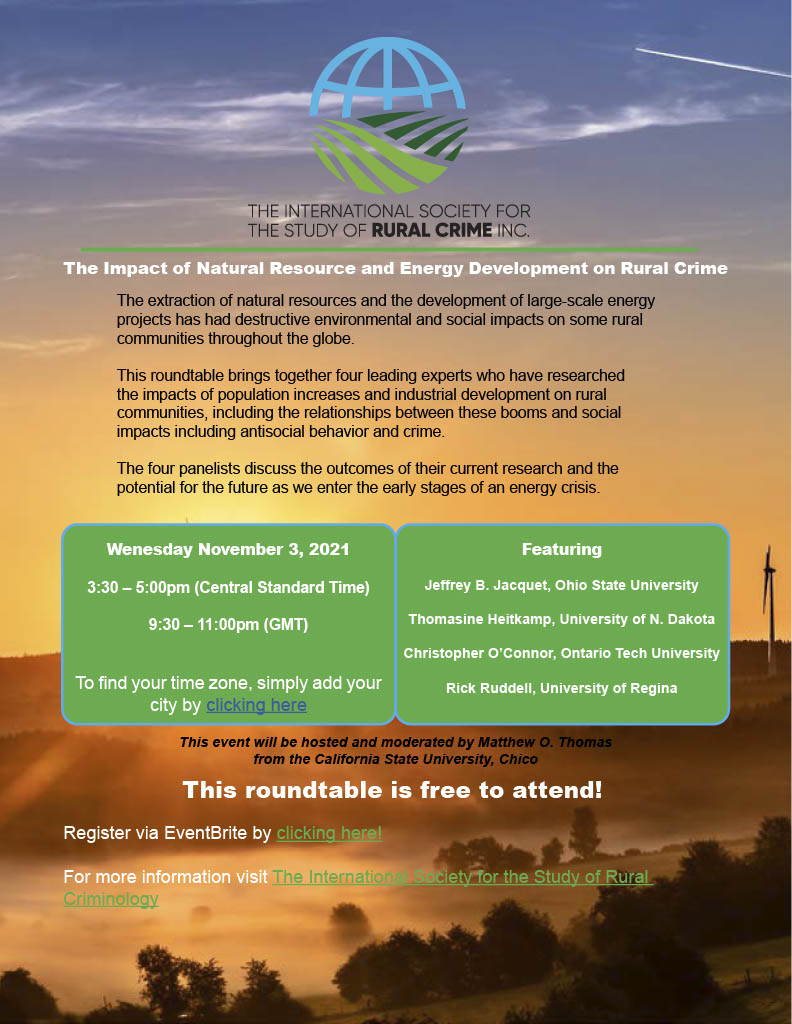
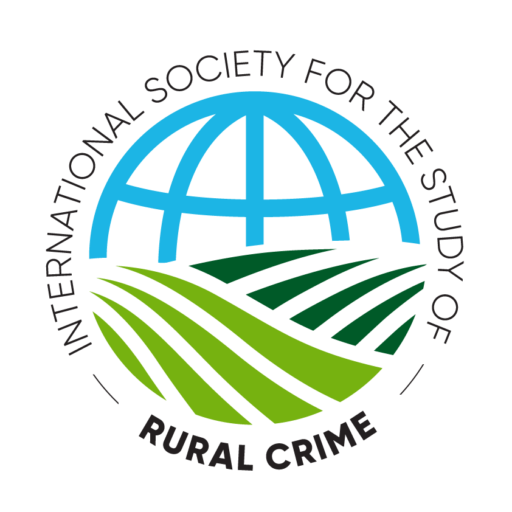
 The event will be hosted and moderated
The event will be hosted and moderated Inspector Farica Prince
Inspector Farica Prince Chief Rob Davis
Chief Rob Davis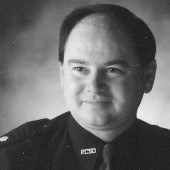 Chief Jim Davis
Chief Jim Davis Mark Prosser
Mark Prosser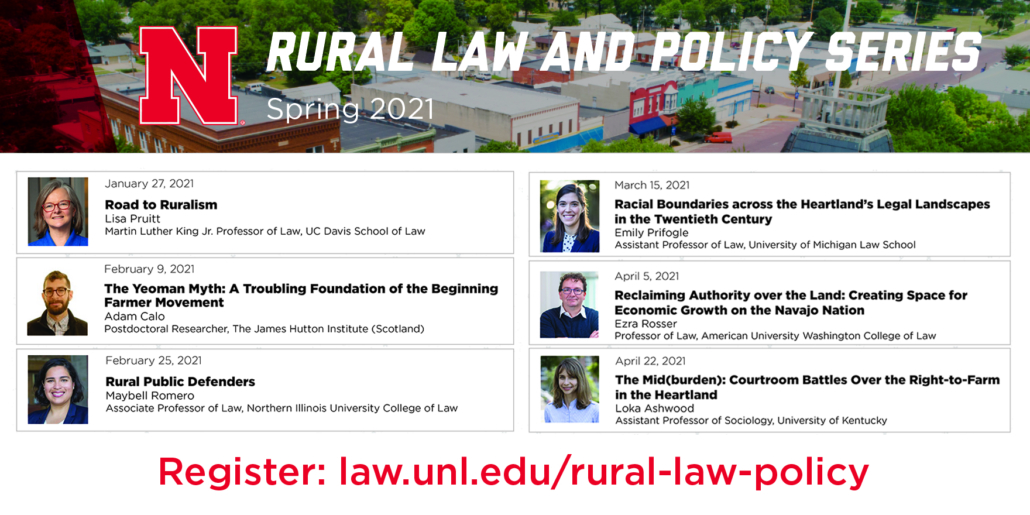
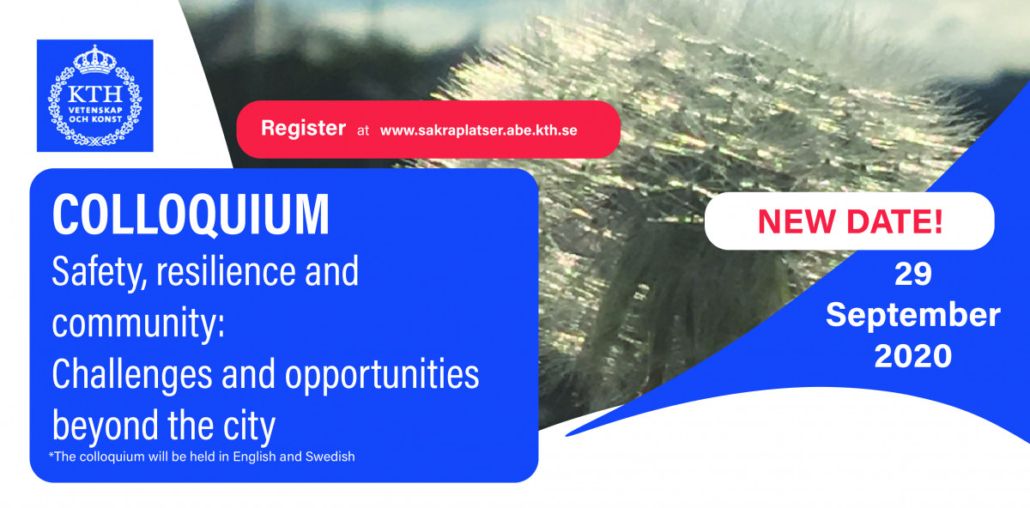
 Dr Danielle Watson
Dr Danielle Watson Dr Liz Curran
Dr Liz Curran Emeritus Professor Joseph F. Donnermeyer
Emeritus Professor Joseph F. Donnermeyer